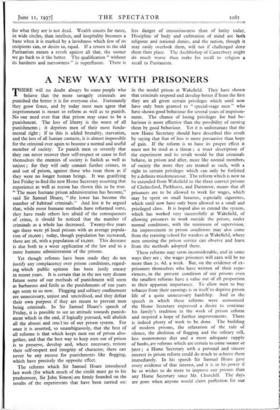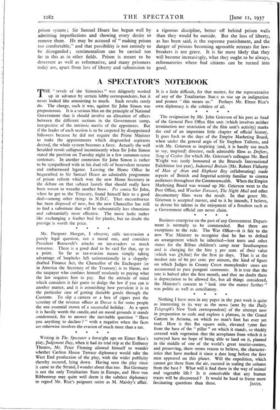A NEW WAY WITH PRISONERS
THERE will no doubt always be some people who believe that the more savagely criminals are punished the better it is for everyone else. Fortunately they grow fewer, and by today most men agree that imprisonment is meant to reform as well as to punish. No one need ever fear that prison may cease to be a punishment. The loss of liberty is the worst of all punishments ; it deprives men of their most funda- mental right ; if to this is added brutality, starvation, and the loss of all human contacts, it is almost impossible for the criminal ever again to become a normal and useful member of society. To punish men so severely that they can never recover their self-respect or cease to feel themselves the enemies of society is foolish as well as unjust ; for they will only commit further crimes, in and out of prison, against those who treat them as if they were no longer human beings. It was gratifying last Friday to find the new Home Secretary asserting that experience as well as reason has shown this to be true. "The more humane prison administration has become," said Sir Samuel Hoare, "the lower has become the number of habitual criminals." And lest it be argued that, while more humane methods have reformed some, they have made others less afraid of the consequences of crime, it should be noticed that the number of criminals as a whole has decreased. Twenty-five years ago there were 56 local prisons with an average popula- tion of 20,000; today, though population has increased, there are 26, with a population of to,000. This decrease is due both to .a wiser application of the law and to a more humane administration of the prisons.
Yet though reforms have been made they do not justify any complacency over prison conditions, regard- ing which public opinion has been justly uneasy in recent years. It is certain that in the not very distant future some of our methods of punishment will seem as barbarous and futile as the punishments of ioo years ago seem to us now. Flogging and solitary confinement are _unnecessary, unjust and uncivilised, and they defeat their own purpose if they are meant to prevent men being criminals. In Sir Samuel Hoare's speech of Friday, it is possible to see an attitude towards punish- ment which in the end, if logically pursued, will abolish all the abuses and crud ties of our prison system. For once it is asserted, so unambiguously, that the best of • all reforms is that which keeps men out of prison alto- gether, and that the best way to keep men out of prison is to preserve, develop and, where necessary, restore their self-respect and integrity of character, there can never be any excuse for punishments like flogging, which have precisely the opposite effect.
The reforms which Sir Samuel Hoare introduced last week (for which much of the credit must go to his predecessor, Sir John Simon) are firmly founded on the results of the experiments that have been carried out in the model prison at Wakefield. They have shown that criminals respond and develop better if from the first they are all given certain privileges which until now have only been granted to "special-stage men" who have shown good behaviour for several years of imprison- ment. The chance of losing privileges for bad be- haviour is more effective than the possibility of earning them by good behaviour. Yet it is unfortunate that the new Home Secretary should have described this result by saying that fear of loss is more persuasive than hope of gain. If the reform is to have its proper effect it must not be used as a threat ; a truer description of the experiment and its result would be that criminals behave, in prison and after, more like normal members of society the more they are treated as such, with a right to certain privileges which can only be forfeited by a definite misdemeanour. The reform which is now to be extended from Wakefield to the three convict prisons of Chelmsford, Parkhurst, and Dartmoor, means that all prisoners are to be allowed to work for wages, which may be spent on small luxuries, especially cigarettes, which until now have only been allowed to a small and privileged class. It is hoped also to extend the system, which has worked very successfully at Wakefield, of allowing prisoners to work outside the prison, under normal conditions, with the minimum of supervision. An improvement in prison conditions may also come from the training school for warders at Wakefield, where men entering the prison service can observe and learn from the methods adopted there.
These reforms may seem inconsiderable, and in some ways they are ; the wages prisoners will earn will be no more than 25. 6d. a week. But, on the evidence of ex- prisoners themselves who have written of their expe- riences, in the present condition of our prisons even the smallest reforms have a value out of all proportion to their apparent importance. To allow men to buy tobacco from their earnings is in itself to deprive prison life of a quite unnecessary hardship. And in the speech in which these reforms were announced the Home Secretary expressed a desire to continue his family's tradition in the work of prison reform and inspired a hope of further improvements. There is indeed plenty of work to be done. The building of modern prisons, the relaxation of the rule of silence, the abolition of flogging and the solitary cell, less monotonous diet and a more adequate supply of books, are reforms which are certain to come sooner or later ; a Home Secretary with a personal and sincere interest in prison reform could do much to achieve them immediately. In his speech Sir Samuel Hoare gave every evidence of that interest, and it is in his power if he so wishes to do more to improve our prisons than any Home Secretary since Mr. Churchill. The days are gone when. anyone would claim perfection for our prison system ; Sir Samuel Hoare has begun well by admitting imperfections and showing every desire to remove them. He may be accused of "making prison too comfortable," and that possibility is not entirely to be disregarded ; sentimentalism can be carried too far in this as in other fields. Prison is meant to be deterrent as well as reformative, and many prisoners today are, apart from loss of liberty and submission to a rigorous discipline, better off behind prison walls than they would 'be outside. But the loss of liberty, as has been said, is the supreme punishment, and the danger of prisons becoming agreeable retreats for law- breakers is not grave. It is far more likely that they will become increasingly, what they ought to be always, reformatories where bad citizens can be turned intct good.

























































 Previous page
Previous page